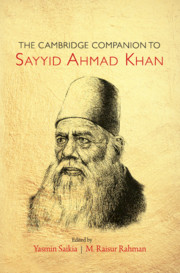Book contents
- Frontmatter
- Contents
- List of Figures
- Notes on Contributors
- Acknowledgements
- A Note on Spellings and Transliteration
- Chronology of Sayyid Ahmad Khan
- Introduction
- Part I Sayyid Ahmad Khan: The rise of a historical figure
- 1 Sir Sayyid on History: The Indian Rebellion of 1857 and Rethinking the ‘Rebellious’ Muslim Question
- 2 Indian Muslims Are the Most Loyal Subjects of the British Raj: Sir Sayyid Ahmad Khan and the Caliphate
- 3 Sir Sayyid on ‘The Present State of Education among Muhammadan Females’
- 4 Naicari Nature: Sir Sayyid Ahmad Khan and the Reconciliation of Science, Technology, and Religion
- Part II Musalman-e Hind: Indian Muslim in a plural environment
- Part III Sir Sayyid today: Enduring legacies
- Conclusion
- Suggested Further Readings
- Index
3 - Sir Sayyid on ‘The Present State of Education among Muhammadan Females’
from Part I - Sayyid Ahmad Khan: The rise of a historical figure
Published online by Cambridge University Press: 26 April 2019
- Frontmatter
- Contents
- List of Figures
- Notes on Contributors
- Acknowledgements
- A Note on Spellings and Transliteration
- Chronology of Sayyid Ahmad Khan
- Introduction
- Part I Sayyid Ahmad Khan: The rise of a historical figure
- 1 Sir Sayyid on History: The Indian Rebellion of 1857 and Rethinking the ‘Rebellious’ Muslim Question
- 2 Indian Muslims Are the Most Loyal Subjects of the British Raj: Sir Sayyid Ahmad Khan and the Caliphate
- 3 Sir Sayyid on ‘The Present State of Education among Muhammadan Females’
- 4 Naicari Nature: Sir Sayyid Ahmad Khan and the Reconciliation of Science, Technology, and Religion
- Part II Musalman-e Hind: Indian Muslim in a plural environment
- Part III Sir Sayyid today: Enduring legacies
- Conclusion
- Suggested Further Readings
- Index
Summary
The title of this chapter refers to the testimony that Sir Sayyid Ahmad Khan gave before the Indian Education Commission in 1882:
The question of female education much resembles the question of the oriental philosopher who asked whether the egg or the hen were first created. Those who hold that women should be educated and civilised prior to the men are greatly mistaken. The fact is that no satisfactory education can be provided for Muhammadan females until a large number of Muhammadan males receive a sound education. The present state of education among Muhammadan females is, in my opinion, enough for domestic happiness, considering the present social and economic condition of the life of the Muhammadans of India.
This statement before a government body makes it clear that Sir Sayyid had a definite priority, that is, the development of his college at Aligarh, designed to reform the education of Muslim men. In urging this priority to the government, he no doubt hoped for more resources to be directed towards his institution. But did that mean he was against women's education? Not necessarily. Sir Sayyid, in fact, has been praised for his support of women's education, although anyone reading the above quote would have to question that generalization.
What were Sir Sayyid's actual views towards women's education, and what did he mean by its ‘present state’? To answer these questions, one needs to consult a variety of his writings on the topic – not just his testimony before a British government body, where his motives were to urge wise expenditure. Among such writings are his biography of his maternal grandfather, Sirat-e Faridiyya, wherein he discusses his own mother's education, and his articles on the subjects of women and their rights and status, which are part of his collected writings. Only after considering in greater detail his opinions and the contexts in which he rendered them can one have a clear idea of whether or not Sir Sayyid supported women's education.
Sir Sayyid had an unusual childhood. He was raised in the household of his maternal grandfather Khwaja Fariduddin Ahmad (1747–1828), a high official in the Mughal court, who also served the British in various capacities. He was also a learned mathematician and astronomer. In Sirat-e Faridiyya, Sir Sayyid recounts reciting his Persian lesson before this formidable figure and receiving a tongue-lashing for bungling his translation from Sa`di's Bustan.
- Type
- Chapter
- Information
- The Cambridge Companion to Sayyid Ahmad Khan , pp. 55 - 68Publisher: Cambridge University PressPrint publication year: 2019



